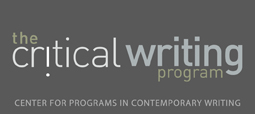Penn Professors on Writing in English
Dr. Emily Steinlight

About the Professor
Dr. Emily Steinlight, the Stephen M. Gorn Family Assistant Professor of English, specializes in nineteenth-century British literature, with a focus on the relationship between political thought and literary form, as well as the history and theory of the novel, mass media and mass politics, the Victorian social sciences, and critical theory. She received her Ph.D. from Brown University, where she held a Graduate Fellowship at the Cogut Center for the Humanities and the Roland G. D. Richardson Fellowship in the Department of English. She has taught at Trinity University and, before that, at the University of Chicago, where she was a Harper-Schmidt Fellow and Collegiate Assistant Professor in the Humanities.
She is currently completing revisions on a book manuscript titled "The Biopolitical Imagination: Literary Form and the Politics of Population," which reveals how Romantic and Victorian writing gave concrete form to a theoretical surplus of human life and recast that surplus as the necessary condition for modern politics. Her next book project, "Unmanageable Thoughts," examines the interplay of Victorian psychology and the social division of labor in order to consider why consciousness emerges as one of the defining problems of the nineteenth century. Steinlight’s essays appear in such journals as ELH, Novel: A Forum on Fiction, and Narrative.
Dr. Steinlight's University Webpage
Personal Writing Process
Professor Steinlight's writing often originates in a moment of defamiliarization: an anomalous moment in a literary text that unsettles everyday assumptions either about that text or about the world, or a debate between two recognized positions that turns out to exclude some unexpected third possibility. Her writing process begins with extensive (and close) reading, research, and detailed note-taking. She then develops and outlines an argument. She always writes in multiple drafts, refining her ideas from one draft to the next in addition to revising for organization, clarity, and style. In the later stages of revision, she particularly values critical feedback from colleagues and friends.
Writing Tips
Professor Steinlight encourages students to make specific arguments and support these arguments with sufficient textual evidence. Recognizing the tendency of some students to over-quote, she suggests choosing quotations carefully, contextualizing them, and analyzing them closely. She recommends that students develop and test their thesis by seeing if it answers a question or takes a position on an already existing debate.
© 2013-2014 The University of Pennsylvania
